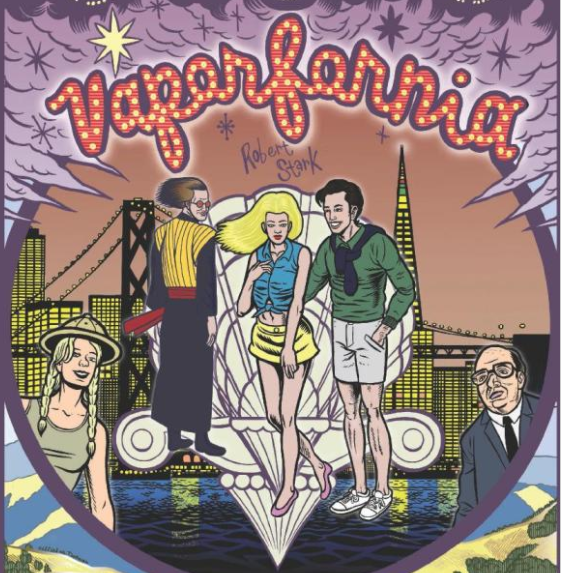Sunken Treasure
Brandon Adamson, as Pilleater announces in his idiosyncratic
“review” of the recently published poetry collection Atlantean Wavelengths,
is “SO BACK”. The defining statement of Adamson’s mature immaturity, the book
marks a new beginning as well as a return to themes that readers of the word-god
of the deep have come to expect: the ancient and futuristic, the ideal and mundane,
the visionary and nihilistic competitive and intertwined as the poet’s
Promethean impulse probes the limits of forces beyond comprehension or alternatively
loses interest.
Conveying a sense of the remoteness that Adamson cultivates,
the poems are clean and calm and evocative of fascination, nostalgia, regrets,
and an arrogant alienation and disconsolate megalomania informed by Adamson’s
taste in retro science-fiction pop and mythical lore. “I drew inspiration from
a number of Atlantis-related films (I always have old movies playing in the
background while I write),” he explains, “most notably Journey Beneath
the Desert, (1961) Warlords of Atlantis (1978), Hercules
and the Conquest of Atlantis, (1961), Beyond Atlantis
(1973), Atlantis, The Lost Continent (1961) Man From
Atlantis (TV Series 1977-1978), The Fantastic Journey (Atlantium episode) War
Gods of the Deep (1965), Goliath Awaits (1981)
and most significantly, Operation Atlantis (1965).” It is
not necessary to have seen all of these to enjoy Adamson’s poetry, but for
those who prefer to read his work the way some people watch Quentin Tarantino
movies, hunting down every obscure samurai film and grindhouse relic to which the
director alludes, the Atlantean mythos as realized in these movies and programs
may lend some shading or texture to the reader’s experience.
Some pieces, like “Last Recorded Transmission”, have a
downbeat character, while “Ingestible Frontiers”, a paean to fake food, stands
out as the funniest. More often, playful moods or references interweave with reflections
of a somber or wistful sort, as with the children’s games or the “yellow
marshmallow Easter bunny” offering poignant counterpoint to the feelings of
loss and disappointment in “Memoirs of a Mental Time Traveler”. Dream women and
elusive inamoratas appear here, too: “that 1960s air hostess” in a spaceship in
“A Postcard from Phraxos” or “this flighty / cutie-pie firefly” in “Sagittarian
Girl”, “sporting a playful expression as / she’s eyeing the next destination”.
These poems are best if imagined recited with Adamson’s distinctive delivery –
although the persistent alliteration of the description “precocious powerpoint
pop princess” rather puts me in mind of Mike Myers’s “hard-hearted harbinger of haggis”, which may not have been Adamson’s intention.
Established in the opening poem, “The Orphans of Atlantis”,
Adamson’s recurrent theme is the notion of exiles from lost milieux and men not
so much against time as above it. Atlantean Wavelengths rejects most
conventional collectivities as “the Atlantean finds himself atomized / by
default” and necessarily solitary, but therefore capable, as a later poem
elucidates, of “harnessing […] atomic energy”. Adamson, with this book, has
sought to disassociate himself from politics, the irony being that, in doing
so, he has written a strangely political work in that it so insistently emphasizes
his non-commitment, with two paragraphs of the introductory essay Adamson posted
at Rabbit’s Foot being about politics – and scattered among the poems
are colorful elements of the author’s private ideology: technocratic exclusivity,
eugenics, transhumanism, and a consumerist’s aesthetic enclavism.
“In an age where nobody actually has real friends (and the
irony of calling reality ‘irl’), we have turned ourselves into Englishmen who
write digital letters to one another as we slowly die in isolation, somewhere
in middle America,” Pilleater argues: “We live in the middle of the dead malls
and shopping centers that have no purpose anymore. Someone else has to find the
beauty in that eclectic mess.” With Atlantean Wavelengths, as Pilleater
puts it, “I could pretend […] I just so happen to find this book in a San
Francisco thrift shop on Divisadero street.” Boasting Adamson’s most attractive
cover design to date, the book is indeed the sort of paperback art object that
might catch one’s eye in a used bookstore. Implicit within the artwork,
however, is an ambiguity. Is Adamson’s jaundiced sun ascendant or on a resigned
decline? Do the diagonals indicate an Atlantis rising from watery depths of the
oblivion of millennia or again submerging with undisguised contempt for the
world of the surface? Prospective readers are hereby encouraged to venture an
answer for themselves.
Rainer Chlodwig von K.
Rainer is the author of Drugs, Jungles, and Jingoism.




Comments
Post a Comment